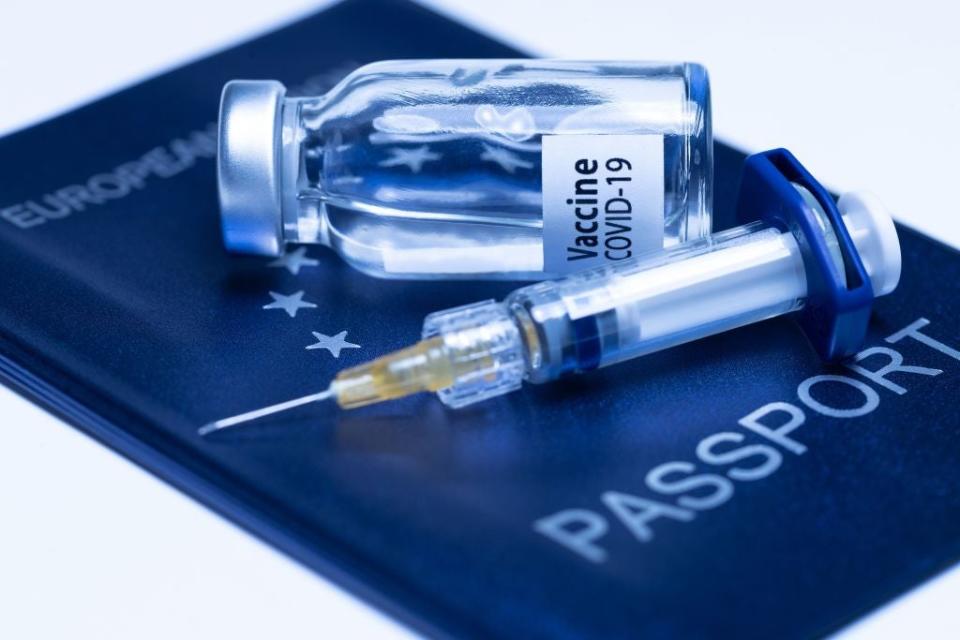Vaccine passports will create more freedom, not less – I know from experience

Many countries are considering a standard form of national ID to document a person’s Covid-19 vaccination status
(AFP via Getty Images)Some in the UK, the US, Australia and elsewhere have opposed ID cards on the basis of privacy. It is unclear how the data on an ID card is different to a passport or driving licence, and in my experience, national identification creates more liberty, not less.
Many countries that have not traditionally had a standard form of national ID card are now considering rolling out ID cards, in all but name, to document a person’s Covid-19 vaccination status.
This should be embraced, even by privacy advocates; rather than give governments access to new data, ID cards simply allow governments to use that data – and serve their citizens – more effectively.
E-governance, which relies on a unified form of national ID, drastically improves public service delivery, whether in education, welfare, or voting. This can create better accountability and transparency in government.
Abstract concerns around civil liberties are a luxury much of the world cannot afford. Even within the world’s richest countries, the poorest and marginalised can struggle to access welfare and other government services. A unified ID would make this much smoother, as I have seen in Bangladesh where I work as a policy adviser to the government.
The country’s national ID card, created in 2006, allows even the most rural and unconnected citizens to address their basic needs, including accessing healthcare, banking, land registry, tax records and education as part of citizen-centric e-governance.
This process was essential to extend welfare to 5 million Bangladeshis who were thrust into poverty because of the pandemic. The ID cards allowed 5 million new bank accounts to be opened and funded with hardship payments over 10 days, while meeting know your customer (KYC) identity verification requirements.
It’s worrying to see some policymakers defining their national identity by their opposition to national identity cards, or by framing this as a privacy issue, when almost every government (as well as many private companies) already has access to individuals’ “private” data.
A further criticism is that such identification discriminates against those who have refused to take the vaccine, or who are unable to for health reasons. This should be respected, and other forms of health certification such as testing or the presence of antibodies should be used.
No freedom is universal. If an individual has not taken a driving test (or is unable to drive for health reasons), it would be unreasonable for them to claim that not being allowed to drive is against their civil liberties.
Denmark, considered one of the “freest” nations in the world, already has a digital “Coronapas” system, which grants immunised citizens access to hairdressers, pubs and restaurants.
National ID can make good governments better. The lack of a national ID can give bad governments an easy excuse for inefficiency.
Another example of joined-up national ID enabling good governance is Estonia. The small Baltic state consistently trumps the US, and ties with the UK, on the Social Progress Index for personal and political rights.
In Estonia, a citizen’s digital identity is used to access more than 99 per cent of public services. Every individual’s ID card has a chip in it, which holds basic information and a digital signature. This is used for everything from tax returns to voting to tracking school assignments. The government predicts it has saved 800 years of bureaucratic work (and perhaps billions in taxes) as a result of its world-leading e-governance system.
The most instructive point about Estonia’s e-governance is that the people support it. As of 2012, 90 per cent of individuals carry a non-compulsory national ID card. This is not a country unfamiliar with authoritarian rule: it was part of the USSR until 30 years ago. Among the nations justified in being concerned about privacy and civil liberties is Estonia. E-governance and national ID, however, allows for good governance, efficiency and transparency.
Estonia’s keyless cybersecurity system, otherwise known as KSI, means all electronic government activity is logged automatically and publicly. In the words of e-Estonia.com, “History cannot be rewritten.” Such transparency should be welcomed, not opposed, elsewhere.
ID cards allow governments easy access to the data they need to do their job well. At a time when citizens of the free world willingly hand over troves of personal information to unelected big tech companies in exchange for the efficient delivery of non-essential services, they are increasingly happy to do the same for their government when it comes to the most essential services.
Rather than being the end of the pandemic, vaccine certification could be the beginning of a new era of transparent, efficient, e-governance.
Anir Chowdhury is the policy adviser of a2i, the Bangladesh government’s flagship digital transformation programme, jointly implemented by the ICT Ministry and Cabinet Office with technical support from UNDP
Read More
‘We’re heading in the right direction’, Stanway says after Lioness loss to Canada
It is in Boris Johnson’s interest to tighten the rules on lobbying
The Queen’s solitude at Prince Philip’s funeral spoke of solidarity

 Yahoo Movies
Yahoo Movies 